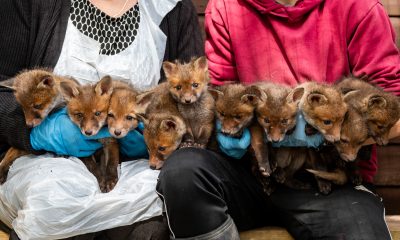Why birds living in wetlands are thriving despite the changing climate
Population numbers have risen over the last 50 years, bucking the trend for other species,
Published
2 years ago onBy
Talker News
By Mark Waghorn via SWNS
Birds in wetlands are thriving - despite climate change, according to new research.
Numbers have risen over the last 50 years, bucking the trend for other species. The habitats offer hope of saving our feathered friends and benefiting the planet.
Long-term trends of waterfowl show strong increases where investments in conservation have improved.
Overall declines have been identified in every other habitat - forests, grasslands, deserts and oceans.
Lead author Dr. Amanda Rodewald, of Cornell University, New York, said: "The rapid declines in birds signal the intensifying stresses that wildlife and people alike are experiencing around the world because of habitat loss, environmental degradation and extreme climate events.
"Taking action to bring birds back delivers a cascade of benefits that improve climate resilience and quality of life for people.
"When we restore forests, for example, we sequester carbon, reduce fire intensity, and create habitat for plants and animals.
"By greening cities, we provide heat relief, increase access to recreation, and create refuge for migrating birds."
The State of the Birds report reveals a tale of two trends in the US - one hopeful, the other dire.
It's the first look at the nation's birds since a landmark 2019 study showed the loss of three billion birds in half a century.
The analysis found waterbirds and ducks have increased by 18 and 34 percent respectively during the same period.
It backs an RSPB report earlier this year that found the "booming" bittern is making a recovery after almost disappearing.
The UK's loudest bird is a well-camouflaged member of the heron family that hides in reed beds.
Ornithologist Dr. Alex Lees described it as a "spectacular conservation success story" thanks to the restoration of wetland habitats.

But Dr. Rodewald and colleagues also discovered more than half of species are declining. Grassland varieties, in particular, have suffered a 34 percent loss since 1970.
And 70 newly identified 'Tipping Point' species have each lost at least 50 percent of their populations in the past 50 years.
And they are on course to lose another 50 percent in the next half century if nothing changes.
Wetlands are the favored staging sites of many migratory birds as they are seasonally or permanently inundated with water.
They host a variety of aquatic plants and animals and create buffer zones that reduce the impacts of storms, providing food and shelter for these tired aviators.
Beloved gems such as Rufous Hummingbirds, songsters like Golden-winged Warblers and oceanic traveling black-footed Albatrosses are vanishing at alarming rates.
Dr. Rodewald said: "The rapid declines in birds signal the intensifying stresses that wildlife and people alike are experiencing around the world because of habitat loss, environmental degradation and extreme climate events.
"Taking action to bring birds back delivers a cascade of benefits that improve climate resilience and quality of life for people.
"When we restore forests, for example, we sequester carbon, reduce fire intensity, and create habitat for plants and animals.
"By greening cities, we provide heat relief, increase access to recreation, and create refuge for migrating birds."
The study used five data sources including the North American Breeding Bird Survey and Christmas Bird Count to track the health of breeding birds across the US.
Co-author Martha Williams, director of the US Fish and Wildlife Service, said: "From grassland birds to seabirds to Hawaiian birds, we continue to see that nearly all groups of birds and types of bird habitat have declined significantly.
"The one group that is seeing an increase in population size are wetland-dependent birds, including waterfowl."
Wetlands also play a role in flood protection and combating climate change - by locking away carbon-rich plant matter in their mud.
Co-author Dr. Karen Waldrop, chief conservation officer for Ducks Unlimited, said: "While a majority of bird species are declining, many waterbird populations remain healthy, thanks to decades of collaborative investments from hunters, landowners, state and federal agencies, and corporations.
"This is good news not only for birds, but for the thousands of other species that rely on wetlands, and the communities that benefit from groundwater recharge, carbon sequestration and flood protection."

The report suggests that applying that winning formula in more habitats will help birds and natural resources rebound.
Williams said: "The North American Waterfowl Management Plan, Federal Duck Stamp Program, grants from the North American Wetlands Conservation Act, and regional Joint Ventures partnerships are all part of a framework that has a proven track record with restoring and protecting wetland-dependent species.
"Now we want to use that precedent to work with our partners to restore bird populations, conserve habitat, and build a foundation for how we respond to the loss of other bird groups."
Data show conservation must be stepped up to reverse the biggest declines among shorebirds, down by 33 percent since 1970, and grasslands birds, down by 34 percent.
Recognizing the need to work at bigger, faster scales, 200 organizations from across seven sectors in Mexico, Canada, the US, and Indigenous Nations are collaborating on a Central Grasslands Roadmap to conserve one of North America's largest and most vital ecosystems - hundreds of million acres of grasslands.
Tammy VerCauteren, executive director of the Bird Conservancy of the Rockies and a representative of the Central Grasslands Roadmap, said: "People have changed our grassland landscape and people are key to its future.
"Collectively, we are working to make a movement to save our grasslands and the people and wildlife that depend upon them.
"Together we can ensure Tribal sovereignty, private property rights, food security, resilient landscapes, and thriving wildlife populations."
Given widespread declines, the report emphasizes the need for proactive conservation across habitats and species.
Co-author D Peter Marra, of Georgetown University, Washington DC, said: "Despite best hopes and efforts, 70 Tipping Point bird species have a half-life of just 50 years - meaning they will lose half their already dwindling populations in the next 50 years unless we take action.
"What we've outlined in this State of the Birds is a recipe for how conservation biologists can work with communities and use surgical precision to solve environmental problems - blending new technology and data to pinpoint the cause of losses and to reverse declines while we still have the best chance - now before more birds plummet to endangered."
The report advises meeting the tremendous need will require a strategic combination of partnerships, incentives, science-based solutions and the will to dramatically scale up conservation efforts.
Co-author Mike Parr, president of the American Bird Conservancy, said: "Everyone can make a difference to help turn declines around,.
"Everyone with a window can use simple solutions to prevent collisions. Everyone can help green their neighborhood and avoid using pesticides that harm birds.
"Everyone who lives in a neighborhood can bring the issues and solutions to their community and use their voice to take action."
Stories and infographics by ‘Talker Research’ are available to download & ready to use. Stories and videos by ‘Talker News’ are managed by SWNS. To license content for editorial or commercial use and to see the full scope of SWNS content, please email [email protected] or submit an inquiry via our contact form.
You may like


Metals can heal themselves just like ‘The Terminator’


Two-faced star has hydrogen on one side and helium on other


World’s oldest big game hunting weapon found


An espresso a day could keep Alzheimer’s at bay


Being bipolar significantly raises risk of premature death: study


Soccer players who regularly use head more likely to develop Alzheimer’s
Other Stories


Touching moment brother and sister reunite after 45 years
"I didn't realize it had been so long."


Meet the 2-year-old chef obsessed with cooking shows
She started cooking when she was 11 months old alongside her mom.


Man running marathon after learning how to walk again
He was in a coma for three weeks after he suffered a fall in October 2020.


Couple find medieval gargoyle imp hiding in their bathroom
The couple took to social media for answers.


Farmer finds ‘unprecedented’ litter of 10 fox cubs
The farmer accidentally dug up their den while working.
Top Talkers

 Food & Drink1 week ago
Food & Drink1 week agoWe eat enough grilled cheeses a year to fill 900 Olympic swimming pools

 Broadcast1 week ago
Broadcast1 week agoOver 50% of Americans trust Google more than their schooling

 Parenting20 hours ago
Parenting20 hours agoSingle mom details struggles of feeding her 12 kids

 Broadcast1 week ago
Broadcast1 week agoAmericans eat enough grilled cheeses a year to fill 900 Olympic swimming pools

 Broadcast3 days ago
Broadcast3 days agoOver 40% of Americans have no clue what a 401k is

 Broadcast1 week ago
Broadcast1 week agoGrocery shopping hungry is costing Americans this much

 Funny1 week ago
Funny1 week agoCops confused by crow mimicking police siren

 Broadcast2 days ago
Broadcast2 days agoHow hard is it for Americans to live sustainably?
